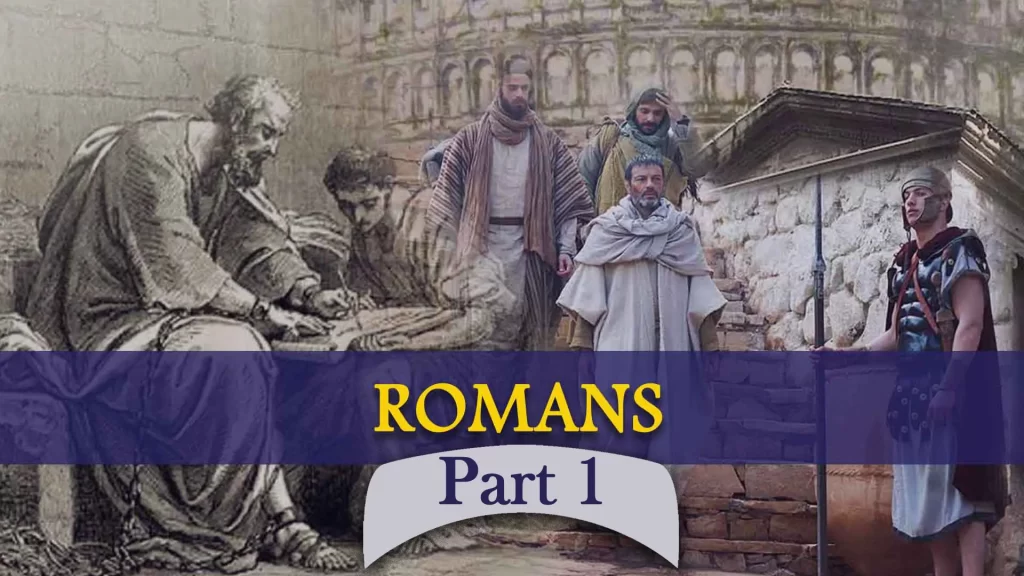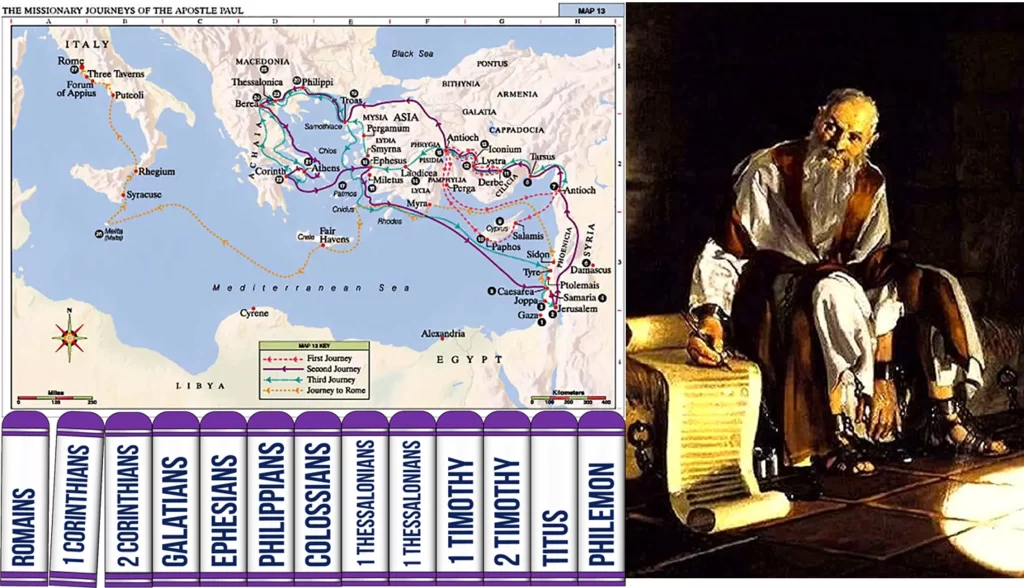The Book
The Apostle Paul is the author of the Epistle or Letter to the Romans. Paul was planning a trip to Rome and this letter was meant as an introduction to the Gentile church. This book was written around 57 A.D. and is considered the longest and the most complex of his letters. The overall theme is the Gospel of Christ is God’s power of salvation, the righteousness of God, the sinfulness of man, and his need for salvation. Justification for sinful man by faith is the central theme. This includes the fact the righteous will live by faith and that righteousness is taught to us by the Holy Spirit.
The Author
God is the true author of every book of the Bible. God inspired the Apostle Paul with the words for the book of Romans. Paul dictated the letter to Tertius who wrote it down.
Romans 16:22 (KJV) 22 I Tertius, who wrote this epistle, salute you in the Lord.
- Raised as a Pharisee
- Highly educated
- Converted in Acts
- The most zealous teacher
- Apostle of the Gentiles
- Wrote 13 Bible books
Romans chapter 1 and verses 1-7 says that Paul wrote Romans and that he was called to be an apostle. The rest of his introduction gives a glimpse of his deep knowledge of scripture.
Please pause and read these verses.
Romans 1:1-7
Saul was raised as a Pharisee and taught in the strictest sect of Hebrew law. He was highly educated and zealous. Saul was converted in the Book of Acts and later his name was changed to Paul. He became the most zealous of the teachers of the gospel recorded in the Bible.
He was not called with the 12 but was called later by Jesus to be the apostle to the Gentiles. He wrote 13 books in the New Testament and possibly Hebrews. Each book he wrote is different because it was written to a different audience, but they all carry the same message.
Romans 1:1-7 (KJV) 1 Paul, a servant of Jesus Christ, called to be an apostle, separated unto the gospel of God, 2 (Which he had promised afore by his prophets in the holy scriptures,) 3 Concerning his Son Jesus Christ our Lord, which was made of the seed of David according to the flesh; 4 And declared to be the Son of God with power, according to the spirit of holiness, by the resurrection from the dead: 5 By whom we have received grace and apostleship, for obedience to the faith among all nations, for his name: 6 Among whom are ye also the called of Jesus Christ:
7 To all that be in Rome, beloved of God, called to be saints: Grace to you and peace from God our Father, and the Lord Jesus Christ.
Theology
Theology is defined as the study of the nature of God and religious belief. Biblical Theology is vital for every minister and witness of God’s word. God calls us to be His witnesses and to stand for His truth. To do this correctly we cannot submit our own ideas and call it God’s word. What we believe but more importantly what we teach must be solidly based on scriptural facts. When we flood our minds with God’s word it will affect how we live our lives.
Theology takes time and dedication, there are no shortcuts. In 2 Peter 1:4-12 Peter, (who has the keys to the Kingdom) gives us the steps to make our calling, election, and salvation sure. Step 1 is faith, but he tells us to add goodness and then add knowledge to our faith. Theology helps us to learn not just what the Bible says but what the Bible means by what it says.
Audience
Paul wrote Romans to all the people in the city of Rome who were saved according to the Book of Acts. He addresses them as called to be saints.
This is an important point because repentance, water baptism, and the infilling of the Holy Spirit are not taught in this book. Paul focuses on the next steps which are building your faith and living a separated life pleasing God. As with all of Paul’s books, it was written to “The Church” which includes us today.
Paul had not yet traveled to Rome on any of his missionary journeys, but the book shows he had insight into the problems these Jews and Gentiles were facing. The strong references to Abraham and the Law suggest he was talking to Jews and that his readers knew the Law well. Throughout the book, he mentions the Gentiles specifically showing he expected Jews and Gentiles to have or learn the same knowledge of the Law. Paul could have written two letters, but he chose to mix and mingle the lessons in one message.
Purpose
Paul took the time to make a connection with each of the churches he was responsible for. In this letter he introduces himself, lets them know of his plans to visit, and offers them the opportunity to give an offering to the poor saints at Jerusalem.
Paul instructs the church, which included Jews and Gentiles, in a completer and “more” orderly picture of the gospel of Christ by laying it out plainly in a way both would understand. This letter to the Romans still gives us the clearest explanations of the doctrine today. Paul wanted “the church” to grow in the knowledge of the truth and to be able to answer anyone who questioned them.
History
Paul wrote the book from the city of Corinth around AD 57 during his third missionary journey and he was not able to visit there until around AD 61. Rome was one of the largest Mediterranean cities at the time and would have had a population of around 4 million. Rome was the seat of the Roman Empire full of politics and wealthy people.
A “church” was already established in Rome before Paul wrote to them. There is no evidence of another evangelist visiting or teaching them. Most likely the Christians were in Jerusalem to celebrate Passover and were first-hand witnesses to the outpouring of the Holy Ghost. In Romans chapter 16, Paul addresses five different households. In those days the Christians met from house to house and in the Jewish Synagogues when possible.

Style and Structure
Romans is written in the Epistolary style, which means a relationship in which people exchange letters. In Paul’s day, the average literary letter was around 200 words. Romans is the longest of all of Paul’s books and contains over 7,000 words. In some cases, his letter was directed at one person and some were written to a common group of people.
Romans is a powerful book and it is not meant to be browsed or read casually. It has been called Paul’s masterpiece, the purest of the gospels, and it should be read often. Listed here is an outline of the topics covered in each section. This is not a complete list.
1:1-17 Introductions
1:18-3:20 The unrighteousness of man
3:21-5:21 The righteousness Christ
6:1-8:39 Impartation of righteousness to man
9:1-11:36 Israel in God’s plans
12:1-15:13 Righteous living
15:14-16:27 Conclusion and greeting






